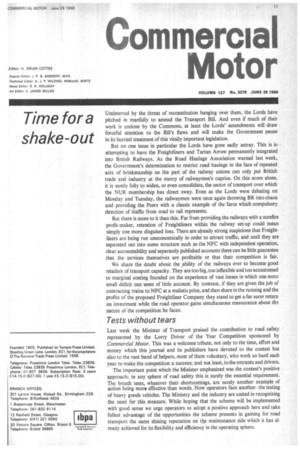Time bra shake-out
Page 19

If you've noticed an error in this article please click here to report it so we can fix it.
Undeterred by the threat of reconstitution hanging over them, the Lords have pitched in manfully to amend the Transport Bill. And even if much of their work is undone by the Commons, at least the Lords' amendments will draw forceful attention to the Bill's flaws and will make the Government pause in its hurried treatment of this vitally important legislation.
But on one issue in particular the Lords have gone sadly astray. This is in attempting to have the Freightliners and Tartan Arrow permanently integrated into British Railways. As the Road Haulage Association warned last week, the Government's determination to restrict road haulage in the face of repeated acts of brinkmanship on the part of the railway unions can only put British trade and industry at the mercy of railwaymen's caprice. On this score alone, it is surely folly to widen, or even consolidate, the sector of transport over which the NUR membership has direct sway. Even as the Lords were debating on Monday and Tuesday, the railwaymen were once again throwing BR into chaos and providing the Peers with a classic example of the farce which compulsory direction of traffic from road to rail represents.
But there is more to it than this. Far from providing the railways with a surefire profit-maker, retention of Freightliners within the railway set-up could mean simply one more disguised loss. There are already strong suspicions that Freightliners are being run uneconomically in order to attract traffic, and until they are separated out into some structure such as the NFC with independent operation, clear accountability and separately published accounts there can be little guarantee that the services themselves are profitable or that their competition is fair.
We share the doubt about the ability of the railways ever to become good • retailers of transport capacity. They are too big, too inflexible and too accustomed to marginal costing founded on the experience of vast losses in which one more small deficit can seem of little account. By contrast, if they are given the job of contracting trains to NFC at a realistic price, and then share in the running and the profits of the proposed Freightliner Company they stand to get a far surer return on investment while the road operator gains simultaneous reassurance about tht nature of the competition he faces.
Tests without tears
Last week the Minister of Transport praised the contribution to road safety represented by the Lorry Driver of the Year Competition sponsored by Commercial Motor. This was a welcome tribute, not only to the time, effort and money which this journal and its publishers have devoted to the contest but also to the vast band of helpers, most of them voluntary, who work so hard each year to make the competition a success; and not least, to the entrants and drivers.
The important point which the Minister emphasized was the contest's positive approach; in any sphere of road safety this is surely the essential requirement. The breath tests, whatever their shortcomings, are surely another example of action being more effective than words. Now operators face another: the testing of heavy goods vehicles. The Ministry and the industry are united in recognizing the need for this measure. While hoping that the scheme will be implemented with -good sense we urge operators to adopt a positive approach here and take fullest advantage of the opportunities the scheme presents in gaining for road transport the same shining reputation on the maintenance side which it has already achieved for its flexibility and efficiency in the operating sphere.
























































































































